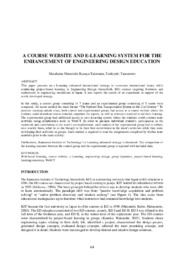| dc.contributor.author | Matsuishi, Masakatsu | en |
| dc.contributor.author | Takemata, Kazuya | en |
| dc.contributor.author | Yamamoto, Toshiyuki | en |
| dc.coverage.spatial | CY - Λευκωσία | en |
| dc.creator | Matsuishi, Masakatsu | en |
| dc.creator | Takemata, Kazuya | en |
| dc.creator | Yamamoto, Toshiyuki | en |
| dc.date.accessioned | 2016-02-04T07:17:30Z | |
| dc.date.available | 2016-02-04T07:17:30Z | |
| dc.date.issued | 2005 | |
| dc.identifier.uri | http://hdl.handle.net/10797/14593 | en |
| dc.description | Περιέχει το πλήρες κείμενο | el |
| dc.description.abstract | This paper presents an e-Learning enhanced instructional strategy to overcome instructional issues while conducting project-based learning in Engineering Design (henceforth, ED) courses targeting freshmen and sophomores in engineering institutions in Japan. It also reports the results of an experiment in support of the newly developed strategy. In this study, a control group consisting of 7 teams and an experimental group consisting of 5 teams were compared. All teams tackled the main theme: “The Optimal Bus Transportation System in the 21st Century.” To promote learning outside class, both control and experimental groups had access to a course website where the students could download course material, templates for reports, as well as reference material to aid their learning. The experimental group had additional access to an e-Learning system where the students could conduct team activities using collaboration tools in WebCT. In order to promote individual student’s participation in the teamwork and contribution to the team’s accomplishment, each student of the experimental group had to submit, on a weekly basis, what he or she thought to be their best contribution to the team’s activities while they were developing their activities in groups. Each student is required to read the assignments completed by his/her team members prior to the team activity. Furthermore, Kanazawa Institute of Technology’s e-Learning enhanced strategy is discussed. The comparison of the learning outcome between the control group and the experimental group is reported with included data. | en |
| dc.language.iso | eng | en |
| dc.publisher | University of Zilina | en |
| dc.relation.ispartof | E-learning and distance learning | en |
| dc.rights | info:eu-repo/semantics/openAccess | en |
| dc.rights | Open Access | en |
| dc.source | CBLIS Conference Proceedings 2005 Integrating New Technologies in Science and Education | en |
| dc.title | A course website and e-learning system for the enhancement of engineering design education | en |
| dc.type | info:eu-repo/semantics/conferenceObject | en |
| dc.subject.uncontrolledterm | Web-based learning | en |
| dc.subject.uncontrolledterm | Course website | en |
| dc.subject.uncontrolledterm | e-learning | en |
| dc.subject.uncontrolledterm | Engineering design | en |
| dc.subject.uncontrolledterm | Group dynamics | en |
| dc.subject.uncontrolledterm | Project-based learning | en |
| dc.subject.uncontrolledterm | Learning outcomes | en |
| dc.subject.uncontrolledterm | WebCT | en |
| dc.contributor.conferenceorganizer | Learning in Science Group, University of Cyprus | en |
| dc.contributor.coordinator | Constantinou, Constantinos P. | en |
